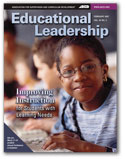Official prayer in the public school is banned. The separation of church and state in school is as indispensable today as it was when our founding fathers wisely encoded it into the law. No one, however, actually prohibits anyone from praying privately in school. Contrary to popular belief, I have found that our schools are filled with people who, for multiple reasons and in many circumstances, call upon the power of prayer.
When I was a principal, I prayed in many ways and in many places. Serious issues and ethical questions (to which answers were not always readily apparent) demanded that I seek wisdom other than that available in human form.
- I watched Debbie, a first-year teacher in a special education class. I recognized Debbie's potential and genuine effort, but I could see she was unable to manage the behavior of the 6-year-olds in her care. Her mentor teacher pleaded the case for giving Debbie another chance. I wrestled with my decision, wondering whether Debbie's talents might surface in another year and knowing that she would lose her income and benefits if she were deprived of employment. The possibility that she might never teach again troubled me. Praying that my decision would place children first and still be fair to this young woman, I decided to terminate Debbie.
- A PTA officer pressed strongly for her son Bobby to have a certain 4th grade teacher, despite the stated policy that parents could not request a teacher by name. I was well acquainted with Bobby's mom. News of any favoritism would spread quickly. I weighed this risk against the turmoil this woman would cause for the teacher she didn't favor if we assigned Bobby against her wishes. Praying that my decision was ethical—not simply political—I assigned Bobby to the class of his mother's choice.
- Judy's dearest friend lost her mother, and Judy asked to attend the out-of-state funeral. Her personal leave bank was empty. Could she count the three days of missed work as sick days? My compassion struggled with my sense of responsibility. Finally I told Judy, that, as an adult, that decision was hers. I hired a sub and reported Judy ill after she called in “with a bad cold.”
- Two children were deposited at our school's door by a social worker at a homeless shelter. She begged us to give the brother and sister temporary placement. Waiving the procedures for registration, we made Meg and Joe part of our 3rd and 4th grade classes until their family found permanent housing. Rules, I reasoned, were ultimately meant to serve children.
When Dilemmas Crowd Our Dreams
Many problems I faced as a principal had no right solution. When such dilemmas appeared insolvable and gigantic, I prayed to do the right thing, to take personal gain out of the equation. I looked deeply within myself for counsel.
Teachers I knew during my years leading schools also prayed—for one another and for the kids they loved. Only after I retired did I hear the stories. One teacher regularly prayed for a coworker who struggled with alcoholism; another prayed for a fellow teacher facing an unexpected pregnancy. Others prayed for strength to deal with a recalcitrant student or to understand each child.
To me, the central question about prayer in school is not whether it should be instituted as official or public. The question that draws me is, How are we as principals and teachers to find strength to create a school environment filled with justice and imbued with love? Do we ask some power greater than ourselves—a power many of us believe in, although in different forms—to sustain our strength and give us hope? To allow us to have faith in kids, in one another, and in ourselves?
Yes, we pray in the public schools. We ask for strength to struggle through 12-hour days, for patience to wade through seemingly meaningless paperwork, and for wisdom to distinguish the essential in our work from that which is simply urgent. Our forefathers were wise to prohibit the dominance of any single religious system over others. This prohibition frees us, each in our own way, to call on every possible resource as we serve children—including resources of the spirit.
